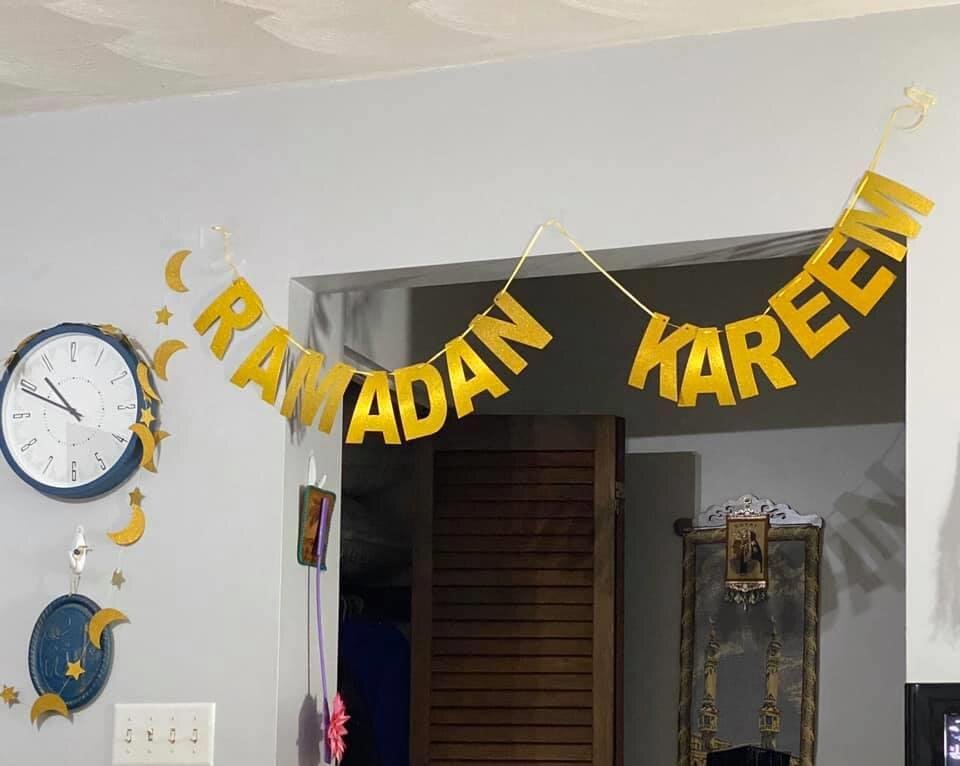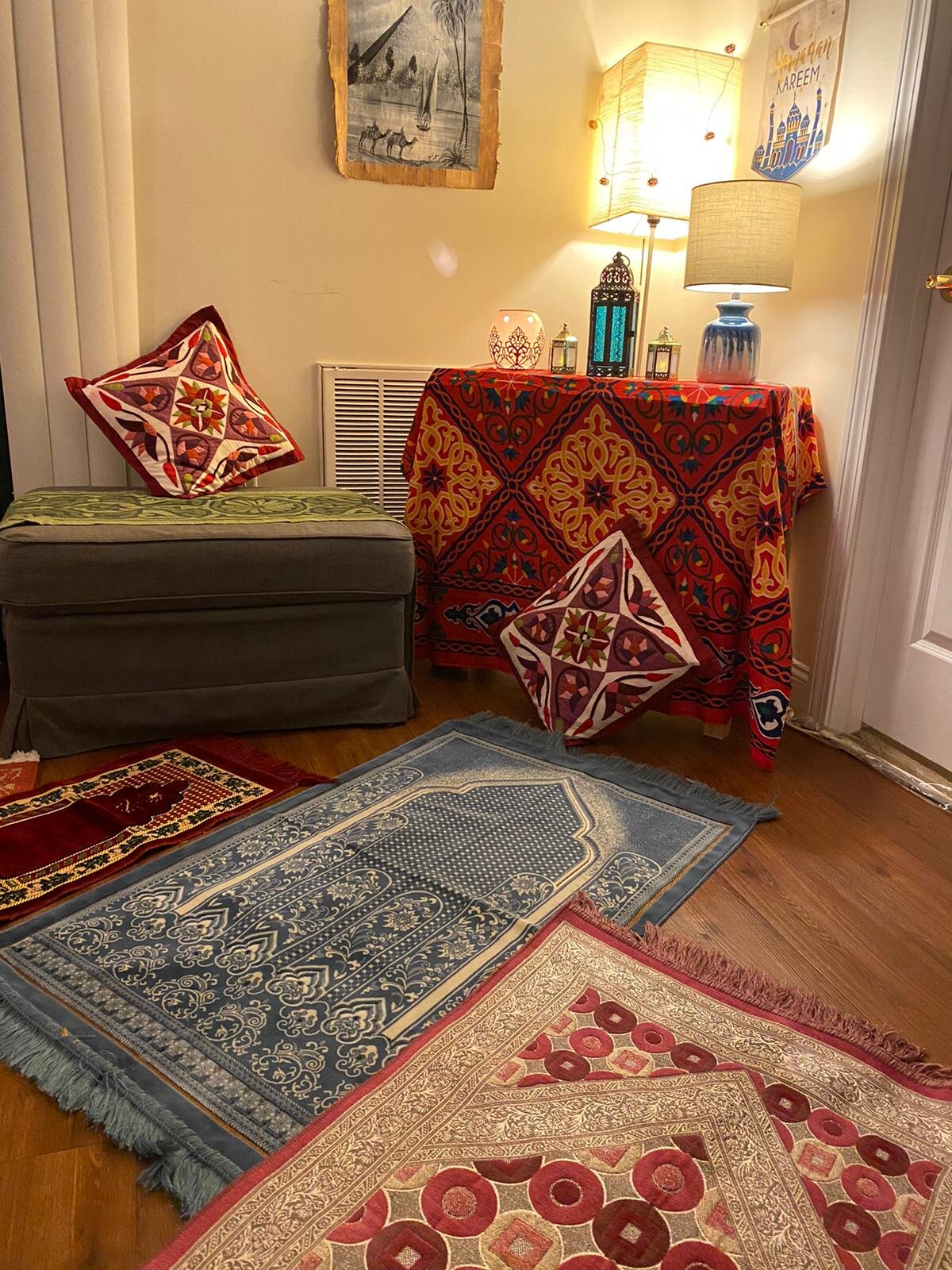For Virtual Ramadan, American Muslims creating mini-mosques at home
A Ramadan greeting hangs inside a Boston-area home. Photo courtesy of Amir Elfass.
On April 24, the world’s 1.8 billion Muslims welcomed their most important holiday with the appearance of the new moon. Usually, they would spend 30 days fasting, studying the Quran and enjoying celebratory “iftars,” evening meals with tables full of food and homes full of family and friends.
This year, none of that is happening in the usual ways. The novel coronavirus and COVID-19 have shuttered most mosques. Instead, Muslims are adapting their 1,500-year-old traditions and finding some unexpected benefits along the way.
“This doesn’t replace the mosque in our hearts, but it is what it is,” said Amr Elfass, project manager for The Islamic Society of Boston Cultural Center, New England’s largest mosque.
Ramadan celebrates the revelation of the Quran, the Islamic holy book, to the Prophet Muhammad in 610 A.D. It is one of the “five pillars of Islam,” the basic obligations all Muslims must complete. It is a mosque-oriented holiday, with nightly Quranic recitation and commentary, special prayers and the performance of service for others.
Prayer rugs in another home in Boston. Photo courtesy of Amir Elfass.
Elfass said many families who would normally celebrate at the Roxbury mosque have brought the arched and bricked mosque into their homes — a twist on the proverbial “If Muhammad can’t come to the mountain, the mountain must come to Muhammad.”
“Our families are decorating their homes for the flavor of Ramadan,” he said, sharing pictures of living rooms strung with tiny lights, banners and crescent moons. “They are putting prayer rugs towards Mecca” — the direction to which Muslims must pray — “and are putting a Quran there. It is like a mini mosque at home and that is where they are praying together.”
Ramadan, with its swirl of fasting, family and prayers, does not usually allow for so much slowing down, he said.
“There is a great beauty in the stuff we are living right now, in the self-reflection and the slowing the pace,” Elfass said. “You can connect to God rather than just doing rituals we normally do.”
In Chicago, Dilnaz Waraich usually spends Ramadan evenings breaking the fast with friends and praying until midnight at the Muslim Community Center, a mosque in the Morton Grove neighborhood. This year, confinement is bringing a new connection.
“There would be all of these men and women leaving the mosque at midnight and we would have this feverish energy,” she said. “So where in the past I would try to build that community physically, now I am trying to build a community between the Quran and myself.”
Another opportunity came in the return of her two sons when their colleges closed. Both would have spent Ramadan on campus, but instead are joining their parents for one more Ramadan all under the same roof.
“The other day we got up at 3:55 a.m. and made eggs and bagels” for the “suhur” meal before the day’s long fast. “We prayed together and we had a conversation about our day. I think before my husband and I had gotten very comfortable being on our own and this was wonderful.”
The Muslim Community Center in Chicago features a Ramadan animation on the homepage of their website.
Omar Ricci also finds a locked down Ramadan in has its appeal. Alone most of the week in Glendale, Calif. while his wife and child care for a relative, he makes use of the time he used to commute.
“I am taking that moment and just becoming a student of faith, a student of the Quran, and engage my faith on a much more quiet and deeper level,” he said. “Having that solitude is, as in any faith, critical to have faith touch your soul. Ramadan is definitely different this year in that regard.”
Gift baskets and an indoor tent for kids in a Boston-area home. Photo courtesy of Amir Elfass.
Khalid Latif is the executive director of The Islamic Center at New York University, where Ramadan is usually the busiest time of year among the center’s 3,00 Muslim students, with nightly iftars, daily Quran recitations, prayers, lectures and more. Much of that programming has moved online for the duration of the pandemic — and that has brought in new visitors and opened new vistas.
“Someone said the other day that this virtual mode allows us to experience other mosque communities they have never been able to go to before,” Latif said. “Going to a mosque right not is closing one live stream and going to another.”
Another pandemic plus is the spotlight it has put on what is necessary to live and what is not, and on the growing divisions of class and race.
“The consumer society we live in tells us our happiness is contingent on buying what they sell, but a lot of people are realizing that is not true,” he said. “And while there will be pressure on us to buy again, there has been an increase in our consciousness that our choices impact how others are able to live. I am hoping people will wake up to see the inequality in a way they have not before.”
In Sugar Land, Texas, a Houston suburb, 26-year-old Zain Khan said not being able to attend the palatial Maryam Islamic Center “totally sucks.” But skipping the iftars, the hanging out with friends has allowed him to laser focus on serving others — a requirement of Ramadan.
“The advantage is right there — we won’t have the distractions out in the world,” he said. “So I can focus on making myself a better human being, a better Muslim.”
One way he is doing that is by organizing an interfaith blood drive for Muslims, Christians, Jews and others in the broader Houston area. Muslims, because they are fasting, cannot give blood, but they can greet, organize and otherwise work behind the scenes.
“I feel entrapment because I can’t go out, but I can encourage people to come to the blood drive and we can face this together.”
Kimberly Winston is a freelance religion reporter whose work has appeared in The Washington Post, The Los Angeles Times, USA Today and more. She is the recipient of the Religion News Association’s 2018 award for best religion reporting at large news outlets.




